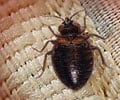A new study has found that fast-spreading parasite species can force sex change and induce virgin births in insects by shutting down immune systems of their victims.
Fast-spreading parasite species, a recent study had concluded, can force sex change and induce virgin births in insects. They do this by shutting down immune systems of their victims.
According to a report in National Geographic News, researchers who mapped the genomes of three species of Nasonia wasp for the first time said that the parasites, of the Wolbachia bacteria genus, cause a gene in wasps to stifle the insect's protein-based "alarms" against the bacterial invaders.As a result, the wasps' antibacterial defenses are never deployed, allowing Wolbachia to begin their dirty work.
This mechanism may also be employed in the other insects and the mites, spiders, and nematode worms that Wolbachia meddle with.
For all these creatures, the hosts' reproductive systems are revamped with freakish results-and an apparent anti-male agenda.
The adverse effect of the parasites is that the male species of their victims are transgendered into fertile females, or killed.
Also, virgin females give birth, without the need for males, and the sperm of infected males is rendered useless in uninfected females.
"For the human world this would be science fiction, but in the insect world, it's very much a reality," said Seth Bordenstein, a professor of biology of Vanderbilt University in Tennessee.
All this Frankenstein-like fiddling has also given these sex puppeteers, as Bordenstein called them, an advantage among parasites.
They can reproduce without killing their hosts, so the bacteria have a better chance of spreading to the hosts' next generation as the hosts themselves reproduce.
In fact, the bacteria have gotten so good at what they do that they are "one of the most successful parasites in the animal kingdom."
"Wolbachia lurk in about 70 percent of all arthropods, a group that includes spiders and mites," Bordenstein said.
"Anytime anyone has a fly that lands on rotten fruit or a fly crawling on their shoulder ... it (likely) has this Wolbachia parasite," he added.
"Sometimes the bacteria can't finish the job, resulting in "gross monsters"-part male, part female," Bordenstein said.
"Wolbachia's success in spreading through hosts-and especially to hosts' offspring-may eventually help geneticists figure out how to combat human diseases carried by insects, such as malaria and dengue fever," he said.
Source-ANI












